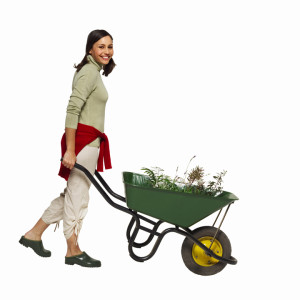Q. I’m curious about whether gardening is actually therapeutic. I find it to be a lot of hard work with little return for my efforts.
A. Gardening is a leisure time activity that has lots of levels of enjoyment. However, it’s not for everyone, just like camping, fishing, boating, etc. Gardening provides people an opportunity to get outside; it’s a form of exercise, a change of pace from their normal routine, and a method of developing new skills. A garden allows us to go back to our roots and grow things. Color throughout a landscape is uplifting on those down days. The sound of water in a fountain is relaxing. You can’t beat the taste and satisfaction of growing home grown fruits and vegetables.
 Unlike a swimming pool, spa or other upgrades, an established landscape significantly adds to property value. There are many cases where property values decline with the loss of a tree. Horticultural therapy is a growing field, out to prove that the power of nature is more than just an urban myth. These therapists, who straddle the world of psychology, ecology and botany, use gardening as a tool to help people cope with issues such as anxiety and depression, as well as physical health conditions like heart disease and post-surgery recovery.
Unlike a swimming pool, spa or other upgrades, an established landscape significantly adds to property value. There are many cases where property values decline with the loss of a tree. Horticultural therapy is a growing field, out to prove that the power of nature is more than just an urban myth. These therapists, who straddle the world of psychology, ecology and botany, use gardening as a tool to help people cope with issues such as anxiety and depression, as well as physical health conditions like heart disease and post-surgery recovery.
In Denver, the non-profit Horticultural Therapy Institute, www.htinstitute.org, helps students gain the skills and confidence to create and manage successful horticultural therapy programs. In a May 2014 USA Today article, Mitchell Hewson talks about the benefits of gardening. Hewson is Canada’s first registered horticultural therapist who founded the country’s largest horticultural therapy program at the Homewood Health Center. The center is an addiction recovery and mental health treatment facility in Ontario, Canada. Hewson uses horticultural therapy with people who are suffering from conditions including dementia and eating disorders.
Research suggests that garden therapy is an efficient way to reduce stress, alleviate depression and accelerate rehabilitation in a variety of clinical settings, with no side-effects. In the 19th century, Dr. Benjamin Rush, a signer of the Declaration of Independence and the “Father of American Psychiatry,” was the first to document the positive effect that gardening had on individuals with mental illness.
Personally, I’m not found of weeding or fertilizing, however it’s work that needs to be done. The gardening task that I enjoy the most may surprise you. I like to make tall grass short. This is a task that most people hire out. Mowing my lawn is an outdoor activity in the fresh air, away from the issues of the day along with burning a few calories. When I’m done I enjoy the look and smell of a freshly mowed lawn. Now to your question: Gardening is therapeutic but it does require some work. The many positive aspects are well worth the effort for lots of different reasons.
Buzz Bertolero is Executive Vice President of Navlet’s Garden Centers and a California Certified Nursery Professional. His web address is www.dirtgardener.com and you can send questions by email at dirtgarden@aol.com or to 360 Civic Drive Ste. ‘D’, Pleasant Hill, Calif. 94523 and on Facebook at Facebook.com/Buzz.Bertolero
Leave a Reply